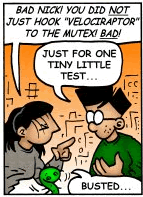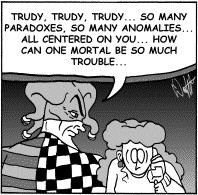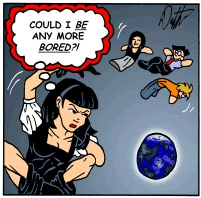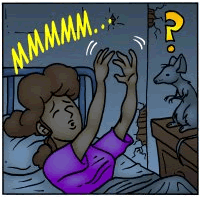Jeff Darlington is responsible for one of the longest-running and most popular geek webcomics ever to exchange packets with your modem – General Protection Fault. Having started out innocently enough in 1998 with what looked like a gag-a-day strip with tech- and geek- humour, Darlington sneakily managed to take his webcomic to crazed serial heights, with the now-(im?)famous year-long mega story arc "Surreptitious Machinations".
In this Reader-run Interview, Darlington speaks about crossovers, women's sexuality, geek vs. gamer strips, and everyone favorite subject – crackpot scientists.
1. How did the writing and drawing mechanism work for your crossover with Bill Holbrook's Kevin & Kell (did you, e.g., each write your own strips from an outline you'd cooked up together?); and what was the motivation for it (i.e., had one of you arrived at a point in your story when you felt the crossover would be somehow opportune, or did one of you just email the other, "You know, I've got this crazy idea…")? – Paul Gadzikowski
My wife came up with the original concept for the K&K/GPF crossover, and we fleshed it out in the weeks leading up to Dragon*Con 2003. Bill and I spent a lot of time talking at our table in Artists' Row, and I pitched the idea to him then. I knew I would be soon arriving to the point where I wanted to introduce the concept of Nick's inventions being able to cross dimensions, and I knew Bill had an ongoing sub-plot about the link between the K&K world and the human world. Bill seemed to like the original concept, and the more we talked, the more the story became fleshed out.
 Interestingly, when it came to writing the finished script, we ended up taking turns. Bill started off by providing me glimpses of his scripts leading into the crossover, as well as the first two weeks of the crossover itself, leaving me some room in the story to write my strips. When the occasional conflict came up about a plot point, we e-mailed back and forth until it was resolved. During the third week, Bill unfortunately had to focus on one of his other strips (he also draws the syndicated "Safe Havens" and "On the Fastrack"), so I took the lead. Again, if there was a plot point Bill felt didn't work, we'd swap emails until we had a compromise.
Interestingly, when it came to writing the finished script, we ended up taking turns. Bill started off by providing me glimpses of his scripts leading into the crossover, as well as the first two weeks of the crossover itself, leaving me some room in the story to write my strips. When the occasional conflict came up about a plot point, we e-mailed back and forth until it was resolved. During the third week, Bill unfortunately had to focus on one of his other strips (he also draws the syndicated "Safe Havens" and "On the Fastrack"), so I took the lead. Again, if there was a plot point Bill felt didn't work, we'd swap emails until we had a compromise.
One of the things I loved about that crossover (other than the fact that I got to be Bill's first crossover partner and that he's such a fantastic artist) is that the crossover has lasting, long term effects on both strips. Of course, the long term effects on GPF may not be evident for quite some time…. 😉
2. Gamester and Mischief don't seem to be designed by yourself – or at least their appearance is not close to the style of the GPF regulars. Were they designed by someone else, or did you give them such a different look on purpose? – Th’_Mole
Gamester and Mischief are 100% my creations and hearken from a number of earlier projects from long before GPF was ever conceived. The Gamester first appeared in 1989 in a long-running comic that I produced privately for my own amusement, which ran from elementary school all the way through high school. At that point, the Gamester was an impish omnipotent villain, but over time, his role began to change. Eventually, he became a sort of cosmic caretaker, tasked with maintaining the well being of a number of parallel universes, using his powers to protect the Cosmos from violations of Time and Space. His style differs from the style of the GPF cast mostly because of his history (we was heavily associated with several of my superhero comics).
For those who are interested, a very detailed history and analysis of the Gamester is available for subscribers of Keenspot PREMIUM. Non-subscribers will just have to wait ever so patiently as I meter out tiny tidbits of information agonizingly slowly through the comic. [evil grin]
Related Question: How and why did you develop the "no mouth" style? – Jamie
It just sort of happened that way. I'm not sure there was any conscious effort to go for a mouthless, "Little Orphan Annie"-eyed look, other than I wanted to create simple characters that I could reproduce quickly and easily. Before GPF, most of my comics were much more realistic, usually in a comic book superhero style (which is evident in certain character designs, such as Dr. Not and the rest of C.R.U.D.E.). But I knew that wouldn't work if I were trying to produce a daily comic strip while working mandatory overtime at my day job, so I tried to create the characters as simply as I could.
 3. You have created some of your strips with a fade-in/out motif, which can be done on computers but not in print. Was this hard to arrange? How was it done? If you ever collect these strips into dead-tree format, how do expect to reproduce them? – Th’_Mole
3. You have created some of your strips with a fade-in/out motif, which can be done on computers but not in print. Was this hard to arrange? How was it done? If you ever collect these strips into dead-tree format, how do expect to reproduce them? – Th’_Mole
Observant Faulties who happen to have a copy of my third book, And the Geek shall Inherit the Earth, should already know the answer to this one, since two strips from there also had fading effects (see page 25). I created two versions of the strips, one for the Web and one for print.
I started by creating the strip as normal, only the fading object/character was drawn and scanned in separately then inserted into the strip digitally as another layer. For the Web version, I then created two Web-sized versions of the strip, one with the layer visible and one without. Then I simply imported it into a GIF animation program and animated the fade. Then for the print version, I created a layer mask and had the object/character fade (statically, of course) into the background. Not difficult, per se, but definitely a little bit of extra work for a nifty effect.
4. You've got a technical background – how much of your comic have you been able to draw from your work experiences? Do you, à la Dilbert, take jokes and characters from your work experience? – Xaviar Xerexes
Not many, actually. GPF is mostly character-based humor in a technical setting. The few instances of dealing with customers and some general business discussion may have had a kernel in work experiences, but that's probably it. Of course, if I did end up using a time machine at work, I probably would have created a paradox that the Gamester would have to "fix," so I wouldn't have any memory of it. (I always wanted a time machine, though….)
5. You usually have a scriptural reference/biblical quote in the lower right hand corner of your website. This is a bit different, at least as far as webcomics go. What role, if any, do matters of faith play in the creation and purpose of GPF comics? – Anonymous Moses
I am, indeed, a Christian, and will happily share my faith with those wish to hear it. The Bible quote originally started as a sort of subversive commentary on a (then) recent news event. When a reader ultimately suggested that I change the quote because it had been up for a while, I started rotating the verses. I now change it periodically whenever I find something interesting and thought-provoking.
However, my faith has no real effect on GPF, other than perhaps a bit of self-censorship on what I will and will not put into the comic. I determined when I started GPF that I would not use it as a soapbox for any religious, political, or other cause I might wish to harp on (despite what some readers have read into certain story arcs). I am a storyteller, and I write GPF to tell stories, nothing more. The characters all have their own beliefs and motivations, and I try to let those express themselves, even if they conflict with my own. I do try to balance conflicting views as much as possible and let people make their own decisions, leaving some things up to interpretation.
I have thought about launching another comic that is tied more closely to my faith, but as yet I haven't had time to pursue such an endeavor. And interestingly enough, I just finished scripting a story that will introduce a character who is a professing Christian. So who knows what the future will bring.
6. How you've dealt with women's sexuality in the strip has been interesting. Ki, who can come across as the strip's "ideal woman," is waiting until marriage. But we haven't seen any motivation for this, just a positive response to Nick's explanation of why he doesn't want to when she asks, "why haven't we?"
Meanwhile, we know that evil Trudy practices (caricatured, unsafe) BDSM, will pursue a "taken" man at all costs, and bait minors with her own body (whether or not she can follow through with it). We also know that Sharon, whose alignment seems to run a bit on the chaotic good side, probably isn't unopposed to sex outside marriage, but within a relationship.
 Were these decisions intentional, or did the characters just sort of emerge that way? In particular, why the decision to assign strong kink to the primary antagonist? – Wednesday White
Were these decisions intentional, or did the characters just sort of emerge that way? In particular, why the decision to assign strong kink to the primary antagonist? – Wednesday White
I think these traits tended to emerge from the characters themselves more than anything. The only conscious decision I can remember was juxtaposing Nick & Ki's decision to wait (which you linked to above) with Fooker & Sharon's decision not to. Interestingly, this sparked one of the GPF forum's liveliest debates, where everyone seemed to focus on Nick & Ki and not on the contrast of the two pairs.
Ki's decision to wait may become evident in a later story, so I'll leave to be answered by the comic itself.
As for Trudy… the problem with Trudy is that she's far more complex than anyone realizes. Many people accused me of making her very one-dimensional when she first appeared, but truth be told, we're only just now beginning to realize there's a lot more to her buried deep within the surface. Her "strong kink" may stem from (or be in contrast
to) something else far deeper that we have yet to discover. Trudy's like… an onion. Onions have layers; Trudy has layers. (This is where someone makes a comment about a parfait. 😉
7. I love your comic, Fooker's the best. I recently read the entire comic from the beginning (I work tech support, so I need something to keep me sane.) and I noticed that in the beginning, the comic seemed very lighthearted and none of the story arcs seemed too connected, save for a few recurring characters and underlying themes. It seemed more of a play on geek stereotypes than a comic with a serious plotline.
Over time you seemed to have started tying it all together, taking things that wouldn't seemingly fit in with each other and making them tie into each other (quite well, I might add). To me this begs the question, did you always plan to have a serious sci-fi/fantasy plotline go along with GPF or did that fall into place for you after a period? – Kenko
One thing to keep in mind is that I had practically the first two and half years of the comic written before it ever reached the Web. I may not have had every detail scripted and set in stone, but I did have many of the general plot points established long before anyone besides a few friends had seen the comic. I always knew Trudy was up to something, and I began to realize that I would never feel fulfilled in writing her story unless I finally revealed what her secret diabolical plans were. So were the seeds of "Surreptitious Machinations" sewn. I may not have known exactly what she was up to when I launched the comic (I certainly didn't know when I wrote the first scripts), but I had a fairly good idea by the time the Gamester was first introduced, which was the middle of Year Two. That gave me a year and a half to set things up for the big "SM."
As for the sci-fi/fantasy elements in general, I've always been drawn to those genres so I figured they would come into play eventually. I never would have sat down and said, "Gee, I'm bored with GPF. I'll make up a sci-fi story just for the heck of it!" If I include it, it must have a place somewhere in the GPF whole.
8. When you started GPF, tech strips were a really big part of the webcomics scene. Now they've retreated to some degree and gamer strips have taken center stage. How has your attitude toward GPF changed as a result of these shifting trends? – T Campbell
That's a very interesting question (and leave it to T Campbell to make it a thought-provoking one. 😉
Personally, I'm saddened by the "retreat" of tech comics. I still get plenty of enjoyment out of User Friendly, Help Desk, and other brethren of the genre, and I consider a number of these artists close colleagues. But I
think part of this shift is a factor of the changing demographic of the Internet and the Web at large.
Back in the mid-1990s when I first got online, computer geeks ruled the 'Net by the mere fact that we were the only ones using it. Many of the first online comics were "techie" comics simply because computer geeks were the ones reading and writing all the content. After the 'Net became popular and hip and everyone and their dog and grandmother were getting online, various subcultures rose as they become popular and subsequently faded when they lost favor with the masses. Gamer culture is – and will be – no different. A new generation has arrived that grew up where Pac-Man and Donkey Kong were considered "old school" and Grand Theft Auto is king, and they now have the financial power to become a marketing behemoth.
 I hold no anger or malice toward gamer strips… except, perhaps, on the too-frequent occasions that someone who's never read my strip or only given it a cursory glance classifies it as a gamer comic. I think it's awesome to see any online comic succeed, for when one of us makes an impact and gets noticed, it often helps to benefit us all. But I think gamer comics will ultimately suffer from the same plague that helped winnow out many tech strips, and that's over-saturation. There is a such thing as too much of a good thing, and you can already see that when people dismiss a comic as "just another gamer comic."
I hold no anger or malice toward gamer strips… except, perhaps, on the too-frequent occasions that someone who's never read my strip or only given it a cursory glance classifies it as a gamer comic. I think it's awesome to see any online comic succeed, for when one of us makes an impact and gets noticed, it often helps to benefit us all. But I think gamer comics will ultimately suffer from the same plague that helped winnow out many tech strips, and that's over-saturation. There is a such thing as too much of a good thing, and you can already see that when people dismiss a comic as "just another gamer comic."
Unless these comics distinguish themselves with some aspect that sets them head-and-shoulders above the rest in their genre, they will ultimately fade away like all the other "just another geek comics" and "just another college comics" that preceded them.
As for GPF, I believe I've established its uniqueness, and that's why it's still around. And hopefully, when the flood of gamer strips have come and gone and the next "next big thing" arrives, I'll still be here. 🙂
9. How do you feel color has affected your comic? What do you enjoy most about GPF? This is an essay question and worth 56% of your grade. 😉 – Jamie
If you couldn't tell from my long-winded responses already, I was always good at essay questions. 😉 Adding color to GPF has been the greatest upgrade I could ever have attempted. I originally started GPF in black and white because I had a sliver of hope at one day becoming syndicated or seeing my comics in print. However, since syndication is no longer an ambition and color books are now an option, I've embraced color and hope to never look back. Some stories, like this year's "Strange Bedfellows", would never have had the same impact without color. My only regret is that they take so much longer to produce!
As for what I enjoy most about GPF, that would be the creative outlet. As previously mentioned, I consider myself a storyteller, and I've been writing comics my entire life, since I was first able to pick up a pen. For years I wrote and drew comics for myself and a small circle of friends, but I never had the exposure as an writer that I have now. With GPF, I've been able to gain valuable feedback, to grow in proficiency as an artist, and to amass a reader base – a greatly widened "small circle" of friends, if you will – from which I can hopefully launch even more ambitious and exciting projects. I never started GPF to gain fame and fortune (although I wouldn't complain if they came my way regardless), but I started it to tell stories and for others to enjoy them (and in GPF's case, to get a chuckle or two). That's all I've ever wanted.
10. Your latest huge story arc is just awesome stuff. You're one heck of an author. I have to ask. What is that crazy Uncle Wisebottom gonna come up with next? We're due for another Mad Science Invention… And we need someone to carry on the Wrinkly Old Guy joke! – Anonymous Flubber
Unfortunately, I haven't had much use for Uncle Wisebottom lately. Now that Nick's Inventor's Gene has surfaced, he's been responsible for most of the crackpot inventions that have surfaced recently. However, Nick can always use some guidance from an experienced crackpot, so don't think I've written Uncle Wise out yet. Uncle Wise will definitely play a part in the next upcoming massive year-long story arc… oops… meant to think that instead of type it…. [evil grin]
The readers are regular contributors to Comixpedia. Our secret masters, they work their fiendish plans behind the curtain, dangling us editors like mindless puppets.
Recent Comments